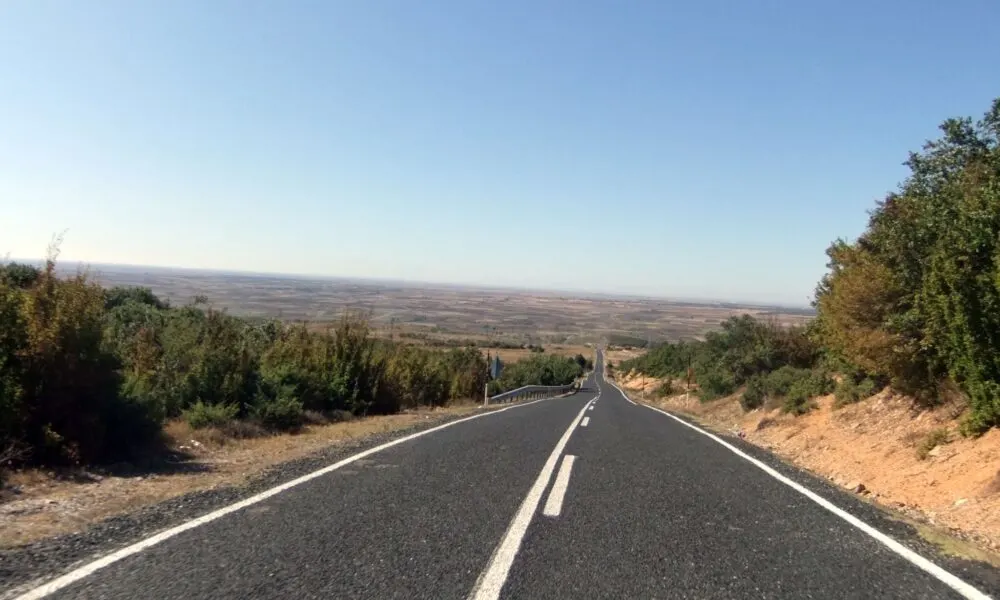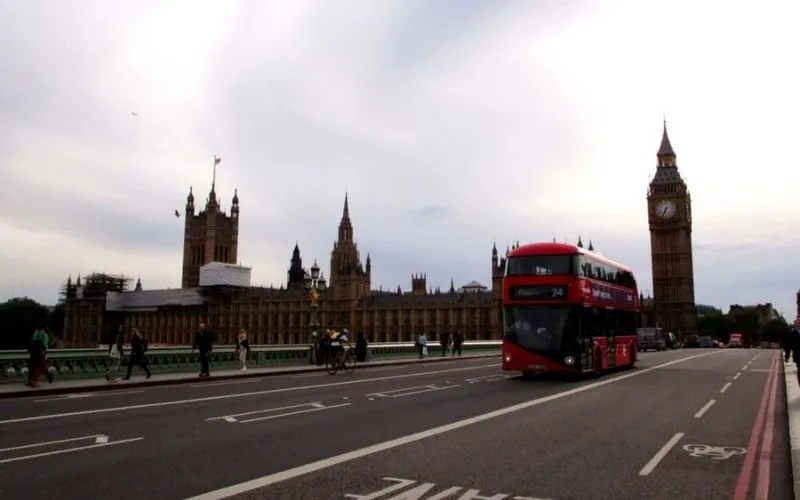To celebrate graduating university, I had a grand plan: to drive around Europe, seeing as many countries and amazing places as possible. To do this, I decided that the most cost-effective way would be to buy a vehicle.
Despite growing up in the UK, however, I still found the process to be less than straightforward.
The first place I actually bought a vehicle was New Zealand, where there was plenty of information available online (even in 2007) and by word of mouth. For the UK though, I found much less. And what I did find, wasn’t really aimed at people who just wanted to buy a vehicle primarily for road trips.
So here’s a simple guide to purchasing a vehicle in the UK, aimed primarily at those looking to road trip around the country and beyond.

Updated 2020. There is one affiliate link in this post. If you click this link and then make a purchase, I may receive a small percentage of the sale at no extra cost to you.
Do you need a car in the UK?
If we hadn’t been planning our big road trip around Europe, I doubt we would have bought a car at all. We lived in the city of Brighton and had easy access to many places via public transport. We did hire a car several times, for mini-trips to places a little harder to reach.
I would really advise against buying a car if you plan to live anywhere in central London. There are very few reasons to do so, seeing that the public transport is fantastic and it would be a nightmare for you to navigate the vehicle around. Parking is also a major issue.
Secondly, question buying a car if you live in any of the other major cities i.e. with a population over 100,000. Despite what the locals will say, the public transport (within the city and to other surrounding areas) will still be pretty good and not too expensive. Furthermore, if you live close to the city centre a lot of places will be walkable.
Realities of driving in the UK
No question about it, British roads are numerous, busy and darn right confusing at times.
- Having a decent map or sat nav is pretty essential. There will be at least a dozen roads and routes that can get you to your destination, some of them faster but busier than others
- Speed limits jump often e.g. from 30 miles per hour (urban areas) to 40mph and then back again within a short stretch of road. Unless you see signs stating otherwise, assume the speed limit of any built up area is 30mph
- British roads are OLD (or built on old ones); consequently, there is no grid system that you might be used to at home
- There are also a lot of traffic lights, roundabouts (rotaries) and one-way systems in the UK
- If you get off the main roads in rural areas you also might be surprised by wonderfully narrow and twisty country roads, barely wide enough to fit one car
- Fuel is not cheap in the UK. Petrol ranges from around £1.20 to £1.40 per litre. Diesel is usually a little more, around £1.28-1.45 per litre
- When you finally stop somewhere (especially in towns and cities), you will most likely have trouble parking – both location and price wise
- Speed camera (both fixed and mobile) are a regular sight on British roads. If caught driving over the speed limit, you will receive penalty points and a fine
Having said all this, British road trips can certainly be fun, just be prepared for surprisingly slow journeys and busy roads.
Practicalities – drivers licences
For visitors from most countries, you can drive on your home licence for up to a year. If your license is not in English, a translation is preferable.
It is possible to exchange your home licence to a British one if you are from one of the ‘designated’ countries and are considered a resident. It is must easier to buy a vehicle in the UK if you have a British drivers licence. This is mostly for insurance reasons.
You’re normally a resident if you have a permanent address in Great Britain that you’ve lived in for at least 185 days.
If you are not from a ‘designated’ country, you will have to take a UK theory and practical driving test.
It is interesting that citizens of some of the designated countries (such as Canada) cannot switch straight to a full licence, even if classed as a ‘resident.’ If Canadian, for example, you will be given a licence that entitles you to only drive automatic cars.
This might sound OK until you realise that most cars in the UK are manual (stick)! When renting, for example, you have to pay more for requesting an automatic or might not be able to get one at all since most of the fleet will be of the manual variety.

Vehicle pricing in the UK
There is not really a specific ‘market’ for cheap traveller vehicles (as there is in New Zealand for example) so it’s hard to narrow down an average cost. This also means that there isn’t the seasonal variation of price that there is in NZ, which is one advantage.
We paid £800 for our 1995 Toyota Estima back in 2011. It was in decent shape and had just over 200,000 kilometres on the clock. British cars usually record miles, but ours was an import from Japan and the odometer had not been changed.
When I say ‘decent’ shape, we did have to replace the exhaust box (muffler) and two shock absorbers shortly after purchase. This took the true price up to more like £1200. For a car of this size and condition, I don’t think that was a bad price at all.
Many of the other cars of this type we looked at (online) were selling for around the 800-1300 mark, depending on condition/mileage.
We chose this type of vehicle for the potential to convert into a mini-campervan. It is possible to buy smaller and less powerful cars for under 1000 pounds.
When to buy
If you are planning to go on a road trip around the UK (or Europe as we did), then it is pretty important that you actually purchase your car a few weeks before you actually plan to leave.
For one thing, this allows you to repair/improve any parts of the vehicle that need it, but it also allows time for the V5C document to be sent to you through the post.
I will explain more about this later (under ‘Purchasing’) but it’s really important to have this document to go outside of the UK since it is the official registration paper that lists you as the owner as the vehicle.

Without this, you could end up in a potentially tricky situation at border crossings or with police.
What to look for when purchasing a vehicle in the UK
One of the most important things to look for when searching for a vehicle is to check when the next MOT (Ministry of Transport test, though it is now actually called the Department of Transport) is due.
For vehicles over 3 years old, a MOT check is needed every twelve months to make sure the car has a basic standard of roadworthiness.
If a car fails, then you have to improve what is needed and re-take the test. Most people don’t tend to sell their calls with the maximum amount of time left on the MOT, so most likely you’ll be looking at vehicles with six or so months remaining before the next test is due.
Check the vehicle’s last MOT papers to see what if there were any advisories, so you have some idea of what might need to be looked at for next time. Our car had only four months left on the MOT (not our preference, bit of a mix-up on the owner’s side but I won’t go into that) and of course we were planning to go abroad for three months.
Where to find vehicles for sale
There are many online resources for finding vehicles for the sale in the UK. Try Autotrader, Gumtree, eBay (both auction listings and classifieds) as well as the Marketplace on Facebook.
In person, look out for adverts on people’s cars, in local newspapers, on supermarket and newsagent noticeboards, and also visit local second-hand car dealers.
Our car was purchased via Gumtree. We had a very specific car in mind and did not have transport of our own so it did take some time finding one that was both close to us (accessible via public transport) and at a reasonable price.
We actually also sold our vehicle six months later via eBay classifieds, roughly 24 hours after I posted the advert. This section is a bit different to the normal auction listings – you can advertise your vehicle for a fixed price and then sell it privately i.e. no other payment goes through the site at all.
Always visit a vehicle in person and check the documentation before purchasing. Scams are not uncommon.

Buying a car in the UK – the purchase process
To put it simply, to buy a car in the UK you need to:
- First, find a vehicle
- Have a MOT test if necessary
- Search for and purchase car insurance
- Pay for vehicle, receive V5C/2 from owner
- Go online and pay for vehicle tax
- Drive vehicle away and wait a couple of weeks for full V5C to arrive
Car insurance in the UK
If you’re from Canada or the US, you may be surprised to discover that car insurance is quite different in the UK. The main difference is that insurance isn’t based on the vehicle.
Instead, car insurance in the UK is focused on specific people driving that vehicle. This means that it is not usually possible to legally drive a friend’s car home from the pub, as it is likely that your friend is the sole insured driver on the vehicle.
You need to have insurance to legally (and safely) drive your new vehicle away. Insurance coverage is usually instant, so when you buy it online/over the phone you can get it to start straight away or on a specific date.
Third Party insurance is the minimum you need to drive legally in the UK. If you have a long (and safe) driving history at home it might be worth trying to get records from your insurance company at home so you can plead your case with a British insurer and potentially get a discount.
How to buy car insurance
In the UK, car insurance is offered by private companies. There are seemingly hundreds of different insurers. Some can be found on comparison sites like Confused.com while others rely on their own website.
Most UK insurers require the main insurance holder (the main driver) to be a UK or EU resident, holding a UK drivers license. Having a non-UK citizen as a named (secondary) driver can be tricky too, so don’t just rely on this.
If you’re thinking of going on a European road trip like we did, you’ll also need to make sure that any insurance will cover you in whatever countries you aim to go to. Most UK car insurance usually cover you for driving up to 30 days in EU countries (subject to Brexit changes).
So if you’re just planning on a little trip to the south of France for a few weeks, make sure you check in the small print that you’re covered and you’re good to go. Thinking of heading to Turkey like we did? Then you’ll need specialist insurance – see our story below.

The difficulty of finding specialist car insurance
I passed my test at 17 driving my mother’s car, left to live in the UK for a year at 18 and then started university. During this time, I did not own my own vehicle in the UK.
Jean Robert, on the other hand, passed his test at 15, drove and owned various cars and vehicles in various provinces, but then left Canada to travel. Alas, all that driving in different provinces and countries doesn’t make for a long history with insurers.
For all of the reasons above, we had a hard time finding insurance. A few quick (who am I kidding, it takes ages!) searches on some of the comparison sites brought up quotes of minimum 2,000 pounds just for me to drive our ‘ideal’ car for a year – the Toyota Estima. And that was without adding Jean Robert as a named (and foreign) driver.
Upon doing research, I realised that there are companies who offer long-term European coverage (longer than a month and outside of the EU!) for people with caravans or motorhomes. However, we did not have the time of funds to comply with the requirements for our car to become motorhome so that plan was out.
UK car insurance for Canadians, Australians, New Zealanders, Americans and South Africans
We eventually bought specialised ‘Walkabout’ insurance which covered both of us, driving our van for six months overseas travel in all EU countries plus Turkey, Tunisia, Morocco, and Albania for an additional premium. We only found one other insurer, but they had a minimum age requirement of 25 (I was 22 at the time).

Registration – V5C (previously known as the log book)
Once you have found a vehicle you want to purchase and have bought some car insurance, registering the vehicle is the next step. The owner of the vehicle will have a document called a V5C, which is car’s registration document. It has all the info about the vehicle on it, as well as the owner’s address.
Needless to say, if the name/address of the owner doesn’t match up, do not go ahead!
All being well, there is a little section on this form (“new keeper’s details” – V5C/2) which you, as the new owner, will need to fill out and keep, as this is your temporary proof that you own the car before the new V5C is sent to you. You’ll need the V5C/2 to tax the vehicle.
The previous owner also has to sign a small section to confirm that they have indeed sold the vehicle and has to send this off to the DVLA. As soon the DVLA gets this, they then update the registration and issue a new V5C in your name. This is sent by post and can take a few weeks.

Don’t leave before receiving the V5C!
Just in case you missed my comment about this before; you need to wait until you get the new copy of the V5C before you leave the UK. Without this, you have little proof that you own the vehicle.
The temporary V5C might be fine for UK police, but as soon as you leave, you are taking a big risk. At every border we came across in Europe, we had to show our full V5C in order to temporarily ‘import’ the car into the country.
Vehicle tax in the UK
Ah, tax, you just can’t get away from it. Vehicle tax is compulsory to drive on UK roads. If you don’t pay this tax, then you risk being fined. Vehicles without tax should be listed as ‘off the road.’ Our car was listed as such but as soon as we bought tax for it this notification was void, and we were good to go.
To buy tax, you need either the vehicle log book (V5C), “new keeper’s details” (V5C/2) or a tax reminder letter. Vehicle tax is paid online and it must be purchased before you hit the road with your new vehicle.
Vehicle tax is not transferable. So if you buy a vehicle with valid tax already on it, you still need to pay.
The cost of vehicle tax depends on the size and type of your vehicle. It is possible to renew it up to two months in advance if you’re abroad, which is handy.
You’re probably thinking, ‘hey but I’m going to be abroad for most of the time, do I have to pay the vehicle tax?’ While it is true that you don’t need it while you’re abroad, it is mandatory to have vehicle tax until you leave the UK and then as soon as you return.
MOTs – The UK’s roadworthiness test
MOT refers to the Ministry of Transport test car inspection. It is an annual test of vehicle safety and roadworthiness. All vehicles need a valid MOT if being driven on the road. If you have the vehicle’s registration number, it is easy to check whether a vehicle has a valid MOT with this free online checker.
Expect to pay up to £55 pounds for a MOT. It’s a relatively quick test (40-45 minutes) and you don’t necessarily need to book, but I would anyway to save waiting around. MOT tests check the condition of the vehicle’s tyres, steering, brakes, emissions etc.
You cannot drive a car around without a valid MOT unless you’re driving to a MOT test or to get repairs. When your car passes the MOT, you will then have a year before it will need another test. All you ever wanted or needed to know about MOTs here.
Time for a road trip in the UK and beyond!
And there you have it, a brief but detailed guide on purchasing a vehicle in the UK. Where will your road trip take you?
Adventure in your inbox
Subscribe to our monthly email newsletter and receive a round-up of our latest outdoor adventures plus other exciting beyond the beaten path destinations
We never share your information with third parties and will protect it in accordance with our Privacy Policy
Check out these other posts about the UK next

One half of the Canadian/British couple behind Off Track Travel, Gemma is happiest when hiking on the trail or planning the next big travel adventure. JR and Gemma are currently based in the beautiful Okanagan Valley, British Columbia, Canada




Kaahren
Saturday 2nd of April 2022
Thank you for a great article!
We will be emigrating from Canada to the UK (Scotland to be precise), and both have at least 15 years of vehicle insurance from BC. I'm hoping we can convince a UK insurer to look at us favourably. But the question is: could we use a short-term accommodation address to do any of this? We have an AirBnB booked for a full month, so ... cheeky, yes, but if we are living there for that long, I THINK it would be okay, but I am interested in what you think.
Thanks again!
Gemma
Saturday 16th of April 2022
Hi Kaahren,
Potentially yes, but I would check with the owner of the Airbnb first. They may not be happy for you to do so.
Marcin
Friday 4th of March 2022
I believe its all about what you gonna to do with your car and where its gonna to be registered.
For non-brits and non-residents, or the persons that want just to import car to their countries, this info is not valid.
For pernament export: 1. You are tax free, there is special declaration to be filled: https://www.gov.uk/guidance/personal-export-scheme-notice-707
2. For DVLA you can send 'pernament export' section, but this is optional as registration office in your country will take care. You shouldnt touch 'new owner' sections as youre non-resident
3. For insurance, you can buy short term insurance from your country by pointing UK plates and you as an owner. This is honored in UK (have a cases where UK police were ok with it)
4. For ownership proof, youre filling purchase contract where you (buyer) and seller are signing off, additionally you can print bank tranfer document just as a additional proof that vehicle was not stolen
Cheers M
Michelle
Thursday 3rd of February 2022
Hey Gemma! Thanks so much for the thorough post!! I am wondering if you could shed some light on a couple of queries I have? My partner has a UK passport, born there but has never lived or visited there, he does have family there so could use the address of relative to help with registration, insurance and license I assume?? I read that you need to live in that address for some of what 185 days?? How could this work??
Secondly, I am Australian, would it be simpler to have only him on the insurance? I am the better driver so I would prefer to share the driving load
Third, We intend on mainly driving mainland Europe and not so much the UK, will this be okay??
Fourthly, to get a UK drivers license do you need to have a UK address for over 185 days or can we use our relatives address ?
Thanks so much :) Michelle
Gemma
Tuesday 15th of February 2022
Hi Michelle,
You are considered a resident of Great Britain if you live there for at least 185 days in a calendar year. It's defined that way so people who are temporarily in the UK (for six months or less) can still use their home license.
We didn't drive in the UK much at all - less than two weeks before we left for Europe and then only a week afterwards. We drove in Europe much longer than we ever did in the UK. But you'd need to check with the insurer. When we did our trip, the Britain was in the EU.
Romulo
Saturday 23rd of October 2021
This car can be sold outside the UK? I was planning a trip starting in the UK and ending in Italy, where I was thinking to sell it.
Gemma
Tuesday 26th of October 2021
Hi Romulo,
That is a great question, unfortunately I'm not sure of the answer. We sold our UK car after our road trip, back in the UK.
Wendy Jackson
Wednesday 4th of August 2021
if I am just visiting the UK and buy a car to travel about how will I get the required documents to tax and show ownership if I have no permanent address?
Gemma
Wednesday 4th of August 2021
Hi Wendy,
This is a tricky conundrum (and a problem we have experienced ourselves in Canada) - you'll need to find an address you can use (do you have any friends in the UK?)